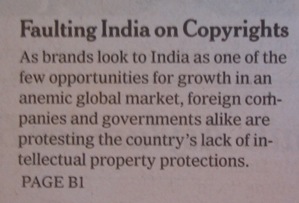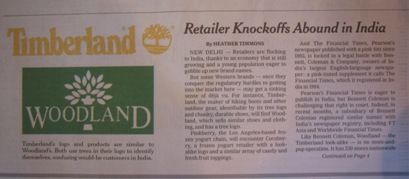 Michael’s post below had an intriguing overlap with the tail end of my post from yesterday: to what extent does randomness undermine meaning? Michael was writing about a provocative proposal by Bernard Harcourt in a discussion he contributed to; Harcourt proposes making more aspects of criminal procedure explicitly random. Harcourt’s basic idea seems to be that the goal of completely rational punishment is a lost cause, and that therefore the criminal justice system should openly embrace randomness. As several of the commenters on Harcourt’s proposal suggest, however, even the attempt to justify punishment may serve some goals. Or as Michael himself puts it: “Randomization . . . would radically undermine the social meaningfulness of the sentencing process.” A random sentence is a sentence without meaning.
Michael’s post below had an intriguing overlap with the tail end of my post from yesterday: to what extent does randomness undermine meaning? Michael was writing about a provocative proposal by Bernard Harcourt in a discussion he contributed to; Harcourt proposes making more aspects of criminal procedure explicitly random. Harcourt’s basic idea seems to be that the goal of completely rational punishment is a lost cause, and that therefore the criminal justice system should openly embrace randomness. As several of the commenters on Harcourt’s proposal suggest, however, even the attempt to justify punishment may serve some goals. Or as Michael himself puts it: “Randomization . . . would radically undermine the social meaningfulness of the sentencing process.” A random sentence is a sentence without meaning.
This seemed very similar to an issue in copyright law that I touched on at the end of my very long post yesterday. One of the troubling aspects of many photograph copyright cases is the amount of randomness that often enters into photographs and videos. Copyright protects the expression of ideas. To qualify as expression, the material has to convey some idea or purpose to its audience; it has to mean. Randomness, however, seems to undermine meaning. Mannie Garcia unintentionally expressed the tension nicely when he described how he captured his now-famous photograph of Obama: “And then it happened: Boom, I was there, I was ready.” To the extent the “boom” outweighs the “I was ready,” it also seems to outweigh meaning. Abraham Zapruder did not intend to convey any message at all about the Kennedy assassination; he was simply there recording when it happened.
There may be another parallel between copyright and sentencing. There are recent copyright decisions expressing the view that an author can go too far in the other direction. To the extent that a set of data is rigidly determined, not by randomness, but by a set of rules or external constraints, courts have held that such data fails to “mean” as well, and again is not copyrightable. This would appear to mirror the recent turn in the constitutionality of sentencing. Random sentences are bad; but so are sentences in which all discretion is removed from the sentencing judge. The Supreme Court has never put it this way, to my limited knowledge, but the intuition might be that such sentences also fail to mean anything; they are not expressions of society’s determination of the seriousness of that particular offense. Meaning, like perhaps all of life, appears to lie in the border between order and chaos.
![]() Doug Lichtman at UCLA is producing a fantastic series of monthly podcasts on IP issues, called the Intellectual Property Colloquium. This month’s episode is on fair use in the Shepard Fairey case, and features a terrific line-up of guests: Mark Lemley, attorney for Fairey; Dale Cendali, attorney for AP; and Ken Richieri, General Counsel at the New York Times, who adds the view of someone on both sides of the issue. Doug asks some pretty good questions, particularly about the notoriously circular fourth fair use factor (the effect on the potential market). It’s worth a listen, and you can also use it for CLE credit in six states, “and any state that accepts any of those through reciprocity,” which I believe includes Wisconsin (do not rely on me for this).
Doug Lichtman at UCLA is producing a fantastic series of monthly podcasts on IP issues, called the Intellectual Property Colloquium. This month’s episode is on fair use in the Shepard Fairey case, and features a terrific line-up of guests: Mark Lemley, attorney for Fairey; Dale Cendali, attorney for AP; and Ken Richieri, General Counsel at the New York Times, who adds the view of someone on both sides of the issue. Doug asks some pretty good questions, particularly about the notoriously circular fourth fair use factor (the effect on the potential market). It’s worth a listen, and you can also use it for CLE credit in six states, “and any state that accepts any of those through reciprocity,” which I believe includes Wisconsin (do not rely on me for this).


